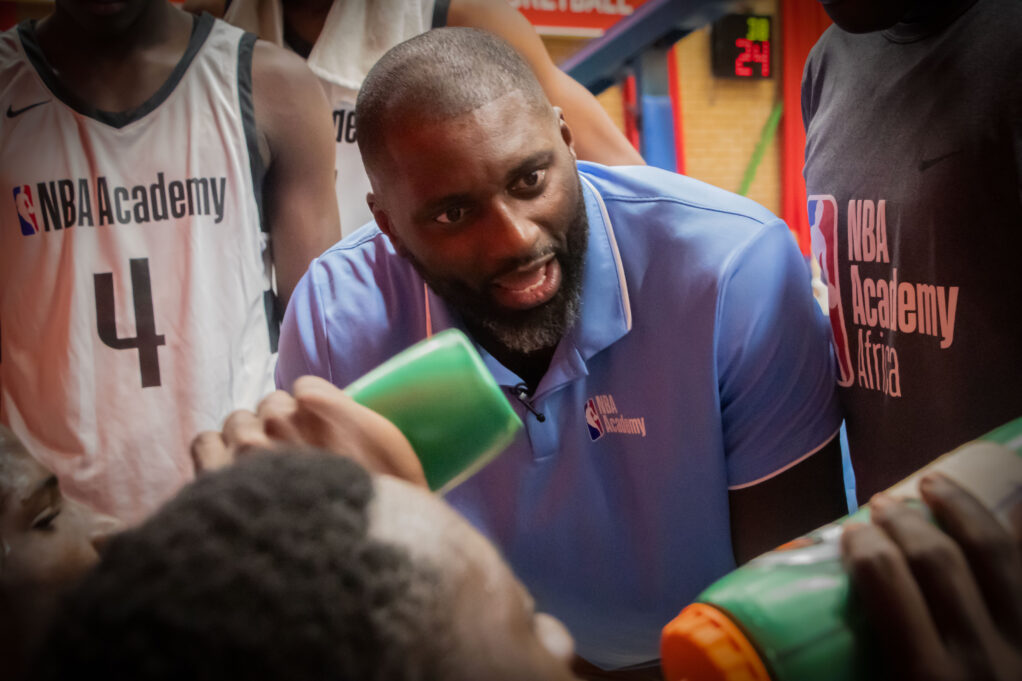“YOU have to leave things before things leave you.” This was the philosophical answer of Cameroon-born coach Alfred Aboya when asked why he retired early in his professional playing career.
Aboya says his body took a pounding on the court, and after six years, he listened to it (his body) and decided to call it quits. Despite calling it a day as a player, the game still flowed in his veins, and coaching would be his next port of call. While learning the ropes of calling the shots from the sidelines, Aboya also decided to further his education.
“I have had a few knee surgeries – a total of six. So when your body gets beat down the way mine did, then you have to find other avenues,” said Aboya. “I tried different things. I decided to be a graduate assistant to get my Masters. During that time, I was figuring other things out.
“Those two years I worked to get my Masters and working as a graduate assistant, I found myself again. I got the calling. I was able to do that (coaching) at the college and moved to a G League team, Iowa Wolves.”

Following the G League stint, Aboya returned to the African continent, where he felt his knowledge would be of greater use to the youngsters at the Senegal-based NBA Academy.
“I felt my expertise would have a significant impact on the continent, so when the Academy called I moved back. I was also able to join the (Cameroon) national team as an assistant,” said the former UCLA Bruins player.
Aboya also highlighted the work of the Academy on the continent. “The Academy works with an exclusive group of kids. There are 54 countries in Africa, and its stronghold is the youth. So we can only select a few of them – and they are the best in their age group,” said Aboya.
“The one thing they bring to practice is their energy and a willingness to work. We impact kids here year in and year out – when other kids around the continent see that, it motivates them,” said Aboya. “Last year, we had Ulrich (Chomche) in the Academy – now he is in the NBA. I think that can only motivate his peers that are still there. It also validates the work that we do on the ground – being able to develop talent. And it’s talent that is able to leave the continent straight to the NBA. That is the most gratifying thing since I joined the Academy.”
View this post on Instagram
Still on grassroots, especially in Cameroon, Aboya is happy they are sending the men and women teams to the U18 AfroBasket in South Africa (September 1 – September 14). Aboya pointed out that Cameroon has been in the wilderness in youth competitions, and investing in the future has become crucial.
“For the longest time, Cameroon has not had junior under-18 teams. We have had athletes who left the country to make careers overseas,” said Aboya. “Youth development is important because kids develop friendships early. When they get to the seniors, they know each other. It (development) helps with the team’s cohesion.
“It’s fantastic. The federation is doing a great thing by sending the youth to these competitions.”
While the juniors prepare for battle in South Africa, Aboya must prepare the senior men’s team for the 2025 AfroBasket qualifiers in November.
Before speaking on the (AfroBasket) qualifiers, he reflected on the experience of their Latvia leg of the Olympic Qualifying Tournaments (OQT). Cameroon saw their valiant pursuit for a spot in the Olympics halted by the host nation in the semi-finals earlier in July.
“It was one thing to qualify for the Olympic Qualifying Tournament and another to participate in it. The big lesson (from the Olympic qualifiers) was that we could compete with the so-called big basketball nations,” said Aboya, who was on a similar stage as a player ahead of the 2008 Beijing Games. “We competed against Georgia, which is 68th in the world, Montenegro (ranked 17th), Latvia (ranked 62nd) and Brazil, which is ranked 12th. And we beat them (Brazil) and lost to Montenegro by four, so we could hang with those countries.
“We belong. It is matter of going back and organising our basketball from the youth level. We must ensure the national team is enticing for our star players and that they find pride wearing that jersey.”

With the AfroBasket qualifiers around the corner, Aboya feels like all eyes will be on Cameroon, who are in Group C alongside Senegal, Rwanda and Gabon.
“Now that we have had a bit of success, other players will want to be part of the team. I’m sure we will have a bigger pool of players to work with. It will be a great problem for us,” said Aboya. “… I am looking forward to that (AfroBasket Qualifiers). It will be a hell of a competition. We saw what South Sudan has accomplished. And they have set the bar so high, first at the World Cup (in 2023) and recently at the Olympics.
“There are great teams at the qualifiers. I hope the actual tournament will be the same. I am trying to find adjectives to explain what kind of tournament we can expect… It will be a highly competitive tournament.”




